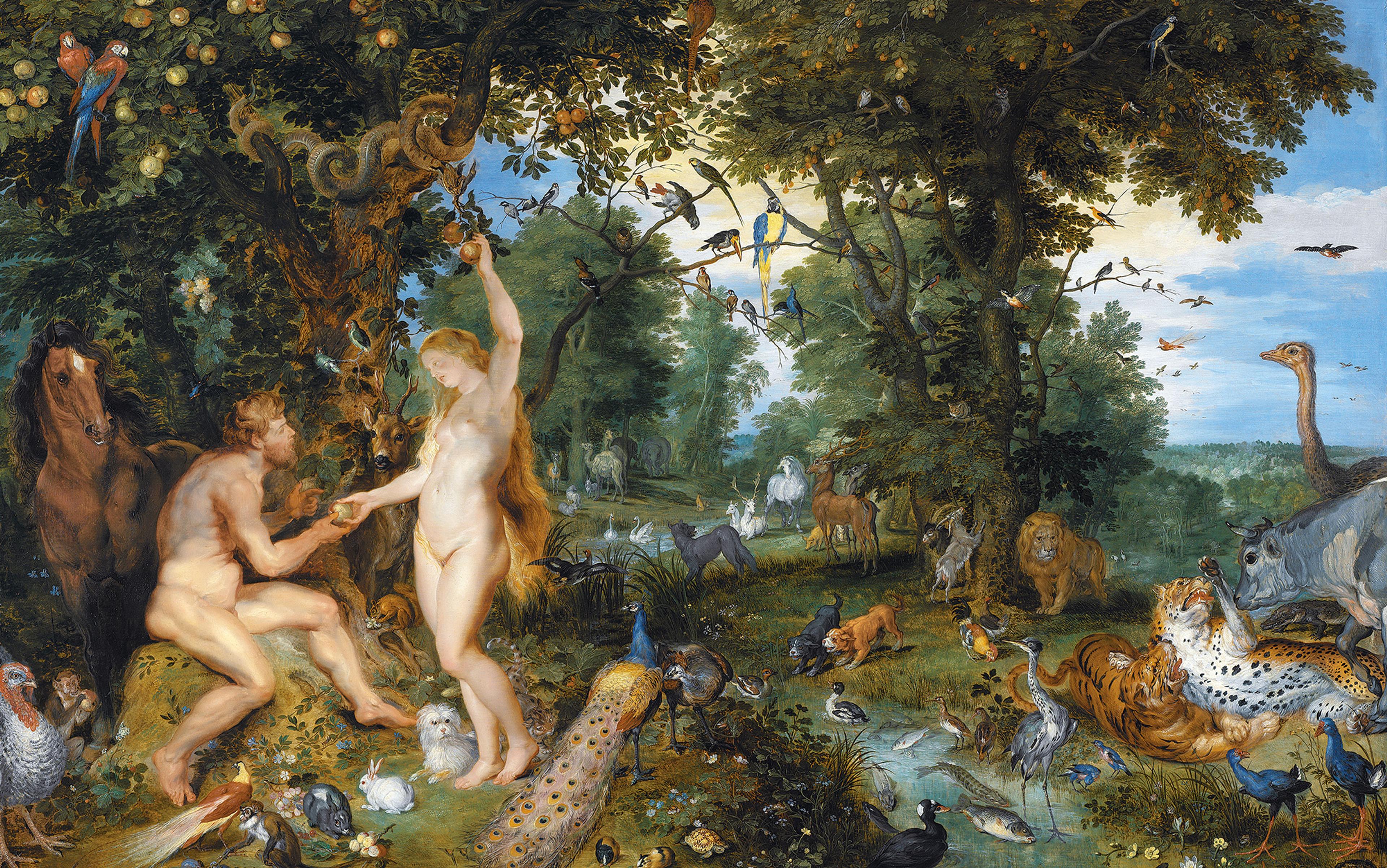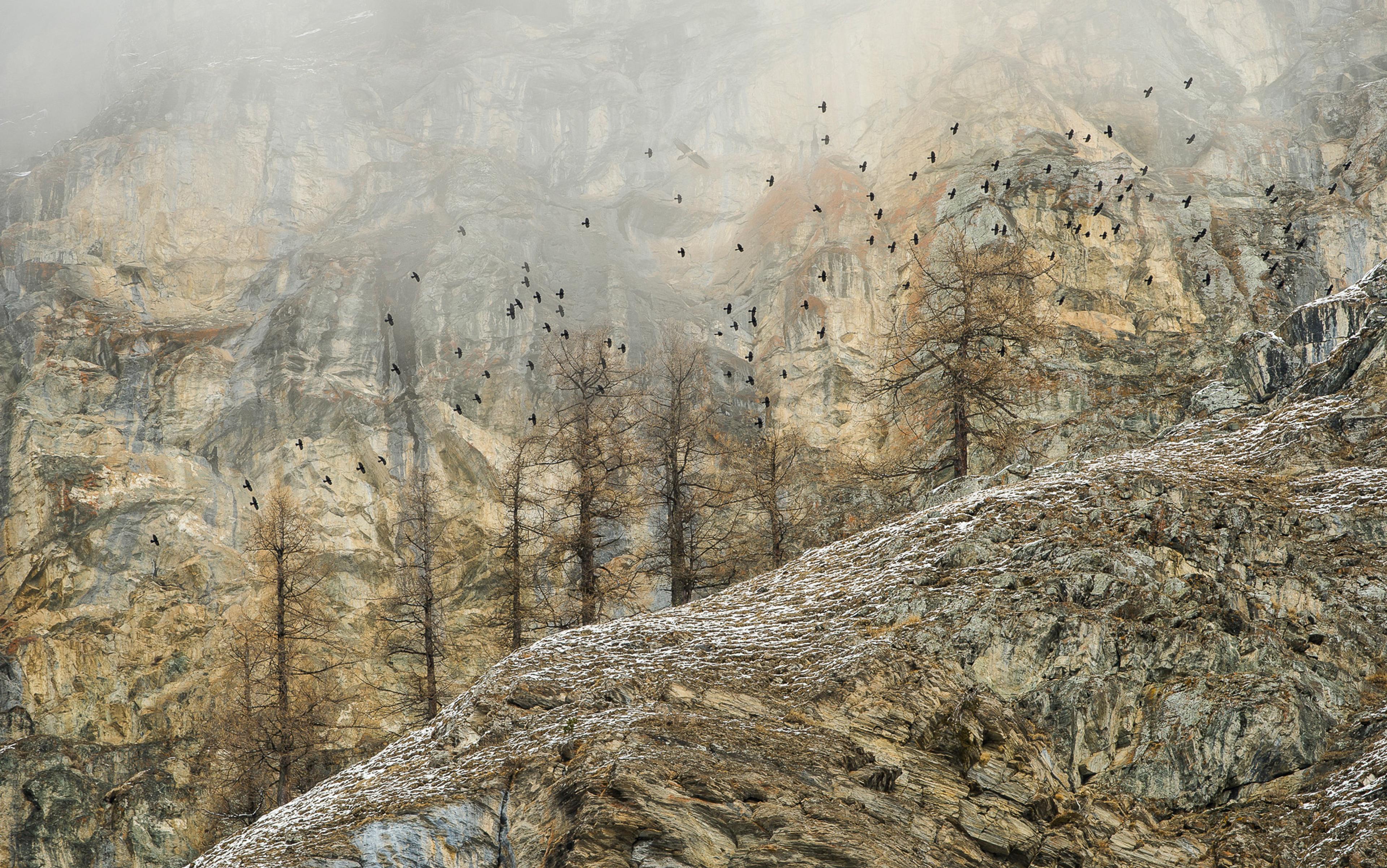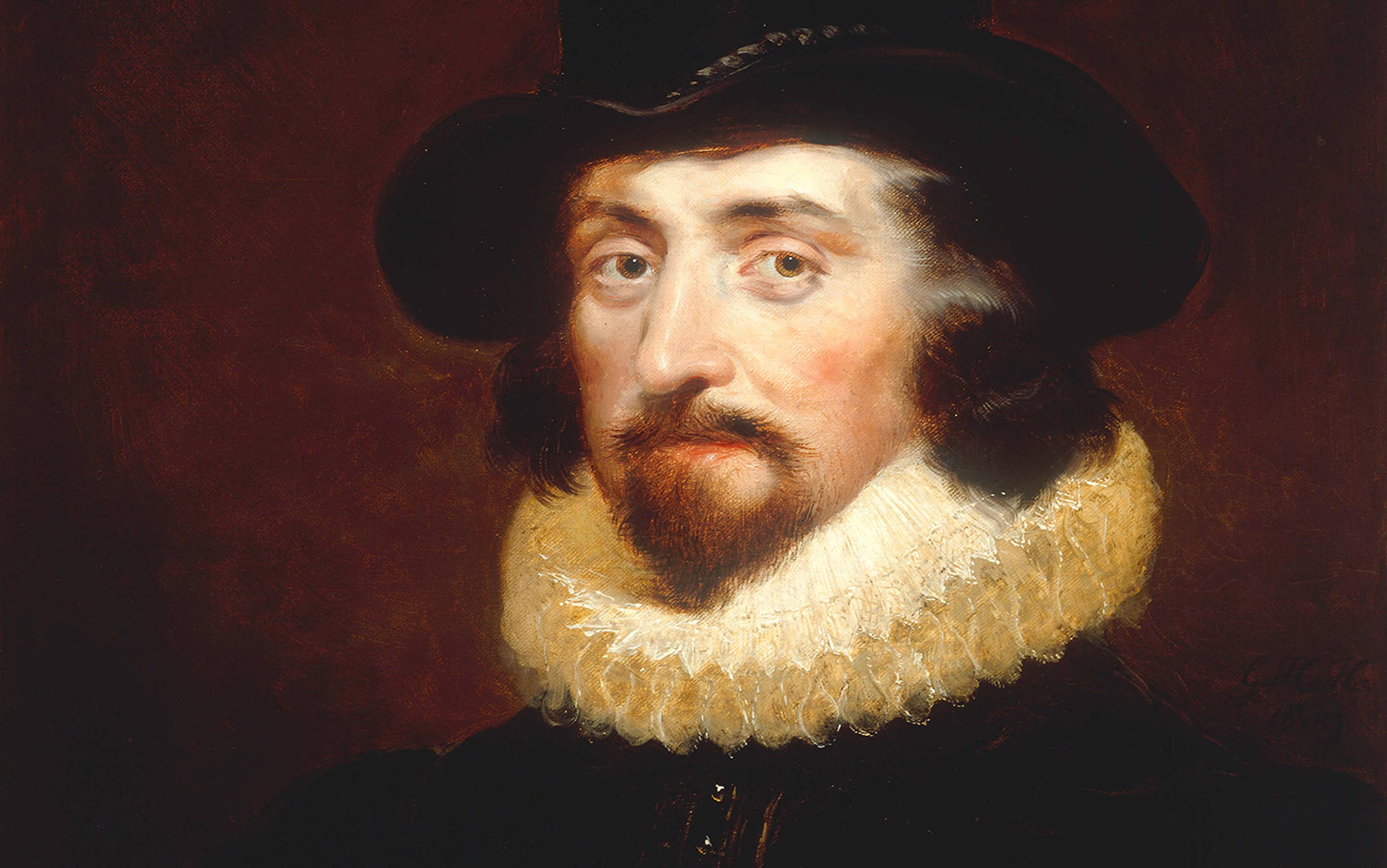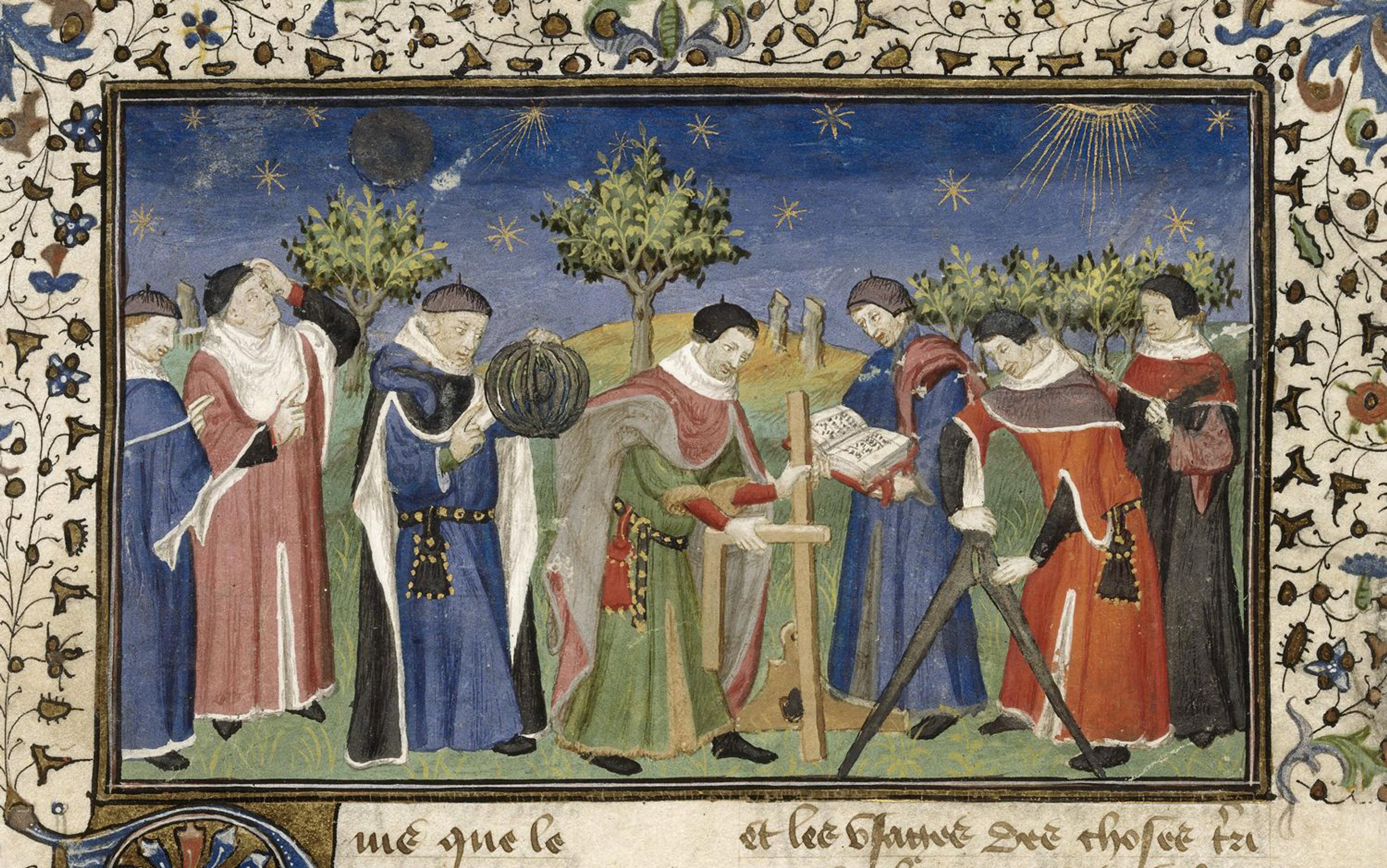By any measure, the scientific revolution of the 17th century was a significant milestone in the emergence of our modern secular age. This remarkable historical moment is often understood as science finally liberating itself from the strictures of medieval religion, striking out on a new path that eschewed theological explanations and focused its attentions solely on a disenchanted, natural world. But this version of events is, at best, half true.
Medieval science, broadly speaking, had followed Aristotle in seeking explanations in terms of the inherent causal properties of natural things. God was certainly involved, at least to the extent that he had originally invested things with their natural properties and was said to ‘concur’ with their usual operations. Yet the natural world had its own agency. Beginning in the 17th century, the French philosopher and scientist René Descartes and his fellow intellectual revolutionaries dispensed with the idea of internal powers and virtues. They divested natural objects of inherent causal powers and attributed all motion and change in the universe directly to natural laws.
But, for all their transformative influence, key agents in the scientific revolution such as Descartes, Johannes Kepler, Robert Boyle and Isaac Newton are not our modern and secular forebears. They did not share our contemporary understandings of the natural or our idea of ‘laws of nature’ that we imagine underpins that naturalism.
To find where our sense of science and natural law comes from, we have to move forward, all the way to the late 19th century. Only then do we see the appearance of the same substantive understanding of scientific naturalism that is commonplace today. In essence, this is the view described and endorsed by the theoretical physicist Sean Carroll in The Big Picture (2016):
There is only one world, the natural world, exhibiting patterns we call the ‘laws of nature’, and which is discoverable by the methods of science and empirical investigation. There is no separate realm of the supernatural, spiritual, or divine; nor is there any cosmic teleology or transcendent purpose inherent in the nature of the universe or in human life.
Richard Dawkins advocates a similar understanding of naturalism in The God Delusion (2006), declaring that ‘there is nothing beyond the natural, physical world, no supernatural creative intelligence lurking behind the observable universe …’ This position informs not only the sciences but the humanities, too. The great majority of contemporary philosophers, writes the philosopher David Papineau, concur in their rejection of supernatural entities. Indeed, this seems to be one of the few things on which philosophers are able to agree.
The phrase ‘scientific naturalism’ and its modern, secular meaning of a purely naturalistic approach to the world comes to us from Thomas Henry Huxley. Huxley was a talented and energetic 19th-century biologist who gained a formidable reputation as ‘Darwin’s bulldog’. He was the one who popularised the use of the expression ‘scientific naturalism’ and associated it with the progress of the modern sciences. Huxley was concerned with what he saw as the undue influence of ecclesiastical authorities on the content and conduct of science. Given the extent to which Anglican clergymen in England dominated scientific posts in universities and scientific institutions such as the Royal Society, this concern was entirely understandable. With like-minded individuals such as the Irish physicist John Tyndall, Huxley sought to wrest control of science from the religious establishment. Integral to his mission was a characterisation of science as intrinsically naturalistic, as opposed to a theology that was said to be intrinsically supernaturalistic. Both of these terms, used in this sense, were coinages of the 19th century. In fact, Huxley adopted his naturalism/supernaturalism dichotomy from the language of German biblical criticism, in which he took a particular interest.
Scientific luminaries of the past had in fact cherished strong religious beliefs
To help legitimate his ‘scientific naturalism’, Huxley provided naturalism with a long history dating back to the Presocratic philosophers of ancient Greece. History would show, so the argument went, that ‘supernaturalistic’ interference in the sciences had always been counterproductive. Huxley went so far as to suggest that the historical process of civilisation could be understood as a perennial struggle between two fundamentally opposed approaches: naturalism and supernaturalism. In ‘Essays Upon Some Controverted Questions’ (1892), he wrote: ‘Naturalism and Supernaturalism have consciously, or unconsciously, competed and struggled with one another; and the varying fortunes of the contest are written in the records of the course of civilisation.’ In Huxley’s view, science was the enemy of supernaturalism, and the march of civilisation was to be understood in terms of naturalism gradually gaining the upper hand over supernaturalism.
While Huxley was an excellent biologist and remarkably well read in contemporary philosophy and theology, his historical reconstructions left much to be desired. For a start, scientific luminaries of the past such as Kepler, Descartes, Boyle and Newton had in fact cherished strong religious beliefs and had typically regarded these beliefs as foundational to their scientific endeavours. The same was true for many of Huxley’s distinguished scientific contemporaries including Michael Faraday, James Clerk Maxwell and Lord Kelvin. Yet Huxley’s historical reconstructions struck a chord by tapping into a growing historical sensibility that envisioned a scientifically advanced Europe moving beyond its religious past and abandoning its commitment to belief in supernatural entities.
A measure of support for Huxley’s version of history came from the nascent social sciences, which developed in the wake of the Enlightenment and sought to offer ‘scientific’, or least non-providentialist, accounts of the development of human history. One of the best-known and most influential schemas was that of Auguste Comte (1798-1857), who maintained that human knowledge inexorably passes through three successive stages: the theological, the metaphysical, and the ‘positive’ (or scientific). On this model, rather than contributing positively to scientific progress, theological assertions were primitive forms of thought that would inevitably be displaced by more developed forms.
Progressivist three-fold typologies of this kind would subsequently become commonplace in the anthropological literature. The influential Scottish anthropologist James George Frazer, in his massive, multivolume work The Golden Bough (1890), offered a sustained argument for the natural progression of human knowledge from superstitious belief in magic, through religion, to an enlightened acceptance of science. These transitions were typically understood as laws of human progress, analogous in certain respects to laws of nature in the realm of the sciences.
Similar sentiments underpinned the 19th-century invention of what historians of science refer to as ‘the conflict thesis’, which holds that this history is characterised by unremitting warfare between science and religion. The history of science is in reality ‘a narrative of the conflict of two contending powers’, wrote John Draper in his widely circulated History of the Conflict Between Religion and Science (1874). The other chief progenitor of the conflict thesis, Andrew Dickson White, offered a similar judgment in his two-volume A History of the Warfare of Science with Theology in Christendom (1896), maintaining that Western intellectual history is to be understood in terms of a ‘conflict between two epochs in the evolution of human thought – the theological and the scientific.’
Crucially, these historical models assumed that Europe was in the vanguard of the march of progress. Draper declared that nations ‘pass through an ascending or descending career’. He wrote that Newton represented the pinnacle of civilisational ascent, while ‘the Australian savage’, whose life ‘is like that of a beast’, was its nadir. It followed that features of Western exceptionalism, such as its increasingly naturalistic outlook, were not historical aberrations, but rather evidence of civilisational superiority. Few social scientists today would profess overt allegiance to these deterministic historical models in the form in which they were originally set out. Arguably, however, tacit assumptions of Western superiority still cast a shadow on our present historical and anthropological understandings. This applies, for example, to our disingenuous bracketing of the truth claims of many traditional cultures and, indeed, of our own forebears. In practice, this amounts to dismissing them as false, but without having to say so.
Leaving aside these associations with Western triumphalism, Huxley’s version of history, in which supernaturalism is engaged in an enduring struggle with naturalism, suffers from two fatal flaws. First, past historical actors, and indeed many non-Western cultures, observe no clear distinction between the natural and the supernatural. Second, and somewhat paradoxically, religious assumptions about the way in which nature is ordered turn out to have been crucial to the emergence of a naturalistic outlook.
To most modern Westerners, the natural/supernatural distinction seems obvious and, well, natural. Yet, a few historians and social scientists have provided intimations of its historical and cultural novelty. In his classic book The Elementary Forms of the Religious Life (1912), the sociologist Émile Durkheim attempted to arrive at a definition of religion that fitted all of the relevant phenomena. He dispensed with the common assumption that ‘belief in supernatural beings’ was an essential component of religion, pointing out that ‘the idea of the supernatural arrived only yesterday.’ It has become increasingly apparent that Durkheim was understating the case: in most traditional cultures, the idea of the supernatural never arrived at all. In his posthumously published The New Science of the Enchanted Universe (2022), the iconoclastic University of Chicago anthropologist Marshall Sahlins enumerated instance after instance of societies that are completely innocent of any distinction between natural and supernatural. Sahlins described the deployment of this dichotomy in anthropological contexts as an ‘ethnographic original sin’. More generally, he points out that our ways of understanding non-Western cultures often involve the imposition of ‘a misleading conceptual apparatus composed of nearly equal parts of transcendentalist equivocation and colonialist condescension.’ Our present natural/supernatural distinction is a clear case in point, and its uncritical application to an understanding of our own history is no less problematic.
How, then, did we come to inherit this salient distinction, and what does its history tell us about the way we apply it to our own culture and those of others? A key phase in the evolution of our modern natural/supernatural distinction came in the European Middle Ages, where we encounter its first linguistic footprints. The initial detective work was conducted by the 20th-century Jesuit scholar Henri de Lubac, whose comprehensive survey of texts of the ancient and medieval periods, Surnaturel (1946), revealed that the word ‘supernatural’ (supernaturalis) and its equivalents were almost completely absent from canonical writings until the 13th century. In fact, we do not encounter the word ‘supernatural’ in the official documents of the Catholic Church until 1567. Christianity had thus existed for more than a millennium without a concept purportedly central to its identity as a religion. De Lubac showed that the first occurrence of the expression ‘supernatural’ came in the writings of the influential 13th-century Dominican philosopher and theologian Thomas Aquinas. While Aquinas’s deployment of this new terminology did not yet represent the exclusive disjunction we are now familiar with, it nonetheless provided the vocabulary that would subsequently develop in our natural/supernatural divide.
The explanations deployed by the pioneers of experimental science were more supernaturalistic than those of their medieval predecessors
It is something of a miracle that the fruits of de Lubac’s labours have come down to us at all. The initial draft of his Surnaturel was compiled while he was on the run from the Nazis in 1940s France. A paper shortage then seriously impacted the publication of the work and limited its initial circulation. Finally, having escaped the unwelcome attentions of Nazis, his own Church took a dim view of his work and its implications, casting him into intellectual exile for several years. Happily, his fortunes changed and he now enjoys a reputation as one of the most influential Catholic thinkers of the 20th century. That said, in spite of its importance, Surnaturel has yet to be translated into English.
De Lubac’s investigation of the idea of the supernatural was not motivated by an idle curiosity about the history of particular words. He harboured a suspicion that the appearance of the modern natural/supernatural distinction had been instrumental in the process of secularisation. In his view, this conceptual development was deeply implicated in the emergence of the idea of an independent and self-subsistent natural world – one that could operate without its supernatural counterpart. In retrospect, the rationale is clear: modern naturalism logically depends on the viability of a natural/supernatural disjunction. What follows is that the historical advent of the idea of the supernatural, paradoxically, established the conditions for the denial of what it was supposed to represent.
De Lubac’s argument about how Aquinas’s relatively innocent distinction eventually morphed into something that was inimical to a religious outlook on the world focused on a series of recondite theological discussions about ‘pure nature’ that took place in the 16th century. The import of these early modern theological discussions is now obscure to most of us, but the case that de Lubac makes is plausible. In any case, there were additional developments in the natural sciences relating to supernaturalism that were just as influential, and their significance is a little easier to follow. Here again, the relevant history reveals some surprises. Counterintuitively, the explanations deployed by the pioneers of experimental science were more supernaturalistic than those of their medieval predecessors.
To help resolve this puzzle, it helps to return to where we began, with Descartes and other pioneers of modern science. When we examine their own descriptions of how they understood the invariable regularities of nature, it becomes clear that they denied any essential distinction between the natural and the supernatural. On the contrary, the core explanatory principle of the new science, the idea of laws of nature, was thoroughly theological, a secular restatement of God’s will. Descartes accordingly understood motion as God’s successive recreation of objects in a predictable path. God’s initial creation of things was essentially no different to his continuing to sustain them in existence moment by moment, and through their various motions and transformations. The mathematical character of laws of motion derived from the divine will. So, too, the fact that laws of nature were eternal and immutable. This was because God’s will, upon which they depended, was eternal and immutable. Nature, Descartes tells us in the Meditations on First Philosophy (1641), is ‘nothing other than God himself, or the ordered system of created things established by God.’ This Cartesian conception of laws of nature was adopted by the most important figures in the scientific revolution.
Boyle, one of the founders of scientific experimentalism, insisted that laws of motion do not arise out of the properties of matter, but ‘depended upon the will of the divine author of things.’ The preface to Newton’s masterwork, the Philosophiæ Naturalis Principia Mathematica (1687), similarly explains that the natural world could ‘arise from nothing but the perfectly free will of God’. Newtonian thinkers elaborated this principle in various ways. Gravity was ‘the immediate fiat and finger of God, and the execution of the divine law,’ wrote one of Newton’s popularisers, Richard Bentley. Samuel Clarke, who acted as Newton’s spokesman in the bitter controversy with the German philosopher G W Leibniz, contended that the course of nature is nothing other than ‘the Arbitrary Will and Pleasure of God exerting itself and acting upon Matter continually.’ Clarke concluded that there really is no distinction between natural and supernatural since events that we typically regard as purely natural come about through the direct exercise of supernatural power.
Newton’s framing of the natural order, and his justification for believing in laws of nature, was supernaturalistic
This supernaturalistic understanding of laws of nature persisted until well into the 19th century. Leading scientific figures defended its theological basis. The philosopher John Stuart Mill wrote in 1843 that ‘men of science’ understood laws of nature to be ‘the expression of the will of a superior; the superior, in this instance, being the Ruler of the universe.’ Leading scientists of the day – John Herschel, Michael Faraday, William Whewell, James Clerk Maxwell, Lord Kelvin, William Benjamin Carpenter – made explicit statements to the effect that laws of nature were divine volitions. However, this theistic conception of the natural order proved susceptible to a hostile takeover. In the latest stage in the evolution of the historical semantics of the supernatural, Huxley, who as we’ve already seen coined the term ‘scientific naturalism’, appropriated the explanatory power of laws of nature, including their immutability and universality, but jettisoned their original theological foundation. Laws of nature thus changed from laws imposed on nature by God, to what they are now: brute facts that we take to be simply intrinsic to nature.
In one of the great ironies of the history of ideas, a notion that had originally been understood as constituting irrefutable evidence of God’s ongoing activity in nature was now posited as evidence for the exact opposite, for its impossibility. In a sense, modern naturalists are in agreement with their theistic early modern counterparts in holding that there is only one world and that there is no distinct supernatural realm. But they adopt completely opposed stances on the theological implications of this position. Newton would have been able to fully endorse Caroll’s insistence that ‘there is only one world, the natural world, exhibiting patterns we call the “laws of nature”, and which is discoverable by the methods of science and empirical investigation’ and, further, would have agreed that ‘there is no separate realm of the supernatural, spiritual, or divine’ (emphasis added). But this was because he did not subscribe to a natural/supernatural distinction. Newton’s overall framing of the natural order, and indeed his justification for believing in laws of nature, was thoroughly supernaturalistic. For this reason, unlike his modern counterparts, he explicitly held ‘discourse of God’ to be integral to the scientific endeavour.
The 19th-century reversal of the theological valence of laws of nature was a remarkable accomplishment. A good part of what made it possible was a retelling of the history of science in a way that concealed the contributions of theological considerations and realigned scientific innovation with an imagined perennial naturalism. Revealing the actual history gives the lie to the presumption that the modern naturalistic approach is vindicated by the success of the sciences. If the working assumptions of such figures as Kepler, Boyle and Newton are anything to go by, the opposite is the case. The re-recasting project of the 19th-century naturalists disguised the theological origins of the idea of laws of nature. However, they found it necessary to retain core aspects of the original explanatory structure, even while denying the supernaturalistic premises that had originally rendered it coherent.
This brings us to the second glaring deficiency of familiar Huxley-style histories that associate naturalism with science and set out a trajectory of the history of science and philosophy that begins with the ancient Greeks, lies dormant during the Christian Middle Ages, and springs back to life with the scientific revolution of the 17th century. Take the common story of the Greek origins of philosophy and science. Up until the 18th century, it had been generally assumed that philosophical thinking originated beyond the boundaries of Europe, among the ancient Chaldeans, Persians, Indians and Egyptians. The 17th-century English philosopher Thomas Hobbes, for example, attributed the origins of philosophy to the ancient sages of India and Persia and the priests of Egypt and Chaldea. He explicitly denied that Greece was the original home of philosophy. This long-standing view, however, no longer comported with the assumptions of Enlightenment thinkers about the intellectual pre-eminence of the West and the association of intellectual advance with a repudiation of theology. It became necessary to rewrite history in ways that stressed both the centrality of European contributions and connected intellectual advancement with naturalism.
Accordingly, Enlightenment philosophers such as David Hume moved the centre of gravity of ancient philosophy to Greece. Hume’s approach was replicated in the canonical histories of philosophy produced by the historians Christoph Meiners (1747-1810), Dietrich Tiedemann (1748-1803) and Wilhelm Gottlieb Tennemann (1761-1819). The Presocratic philosophers of ancient Greece, beginning with Thales of Miletus became the beneficiaries of the new Eurocentric approach to knowledge. These ‘Ionian naturalists’ were said to have abandoned the supernaturalistic explanations of the poets and theologians, replacing them with proto-scientific explanations. On account of both their geographical location and their putative naturalism, these men could serve as exemplars of the model of cultural advancement that underlay the anthropological assumptions of the age. This version of the history of philosophy is still very much current today.
The adoption of monotheism could thus promote an ethos of naturalisation and disenchantment
The truth of the matter is rather different. Aristotle tells us that Thales of Miletus, first of the touted naturalistic philosophers, declared that ‘all things are full of gods’. Indeed, the rationale behind the ‘scientific’ outlook of the Presocratic philosophers is typically that the world is governed by an all-pervasive divine power. In Creationism and Its Critics in Antiquity (2008), the classicist David Sedley righty observes in this context that to associate Presocratic thought with a form of naturalism represents ‘a serious mis-perception of the Presocratic agenda’. The received story also completely mischaracterises the subsequent influence of Christianity, which in these dubious histories is alleged to have stalled the progress of science. A number of the progressivist histories of the 18th century suggested that the rise of Christianity had led to the suppression of science and rational thought. The Marquis de Condorcet announced in his Sketch for a Historical Picture of the Progress of the Human Mind (1795) that ‘the triumph of Christianity was the signal for the complete decadence of philosophy and the sciences’. This view became an idée fixe in many subsequent histories. The influential philosopher of science Karl Popper was still under its sway two centuries later: ‘the scientific tradition’ was inaugurated by Thales of Miletus and his immediate successors, and it died in the West when it was ‘suppressed by a victorious and intolerant Christianity’, he wrote in The Myth of the Framework (1994). For Popper, the revival of science began during the European Renaissance and ‘found fulfilment in Newton’.
It is certainly true that, when early Christian thinkers came to assess the scientific contributions of their Greek predecessors, they were somewhat ambivalent. For at least some of them, however, this was not owing to an animus against naturalistic science. On the contrary, it was because they encountered too many gods and divine powers at work in the natural world. The prevailing science was deemed to be too promiscuously supernaturalistic. Christian thinkers typically denied the divinity of the heavenly bodies and their capacity to be self-movers, for example. The adoption of monotheism could thus promote an ethos of naturalisation and disenchantment.
It was partly for this reason that the early Christians were considered to be atheists by their pagan contemporaries. They believed in an insufficient number of deities. Tyndall, Huxley’s fellow naturalist, in his vindicatory history of scientific naturalism, spoke in 1874 of science demanding ‘the radical extirpation of caprice, and the absolute reliance upon law in nature’ and of its ‘desire and determination to sweep from the field of theory this mob of gods and demons’. He might just as easily have been describing the disenchanting consequences of adopting a strict monotheism. The German philosopher G W F Hegel recognised this tendency in his astute observation that ‘Christianity has emptied Valhalla, felled the sacred groves, uprooted the shameful superstitions of the people.’
One final problematic feature of these 18th- and 19th-century progressivist histories of human knowledge is their incipient racism. In the cases of Hume and Meiners, this element is explicit. Hume declared that tales of the supernatural abound only among ignorant and barbarous nations. Belief in the supernatural was characteristic of the ‘monkish historian’, ‘the vulgar’, ‘ignorant people’, ‘barbarous Arabians’, the ‘ignorant and stupid’ and so on. In a now-notorious remark, Hume also commented on the intellectual inferiority of dark-skinned peoples: ‘I am apt to suspect the negroes to be naturally inferior to the whites. There scarcely ever was a civilised nation of that complexion.’
Meiners, who bequeathed to posterity the unfortunate term ‘Caucasian’, followed Hume in dismissing the intellectual contributions of the ‘dark and ugly’ peoples who, on account of their supposed weakness in body and mind, were deemed constitutionally incapable of developing anything like systematic rational enquiry. Meiners spoke dismissively of the ‘childishness and mediocrity of the knowledge of Asiatic and African peoples’. Accordingly, it fell to the bright and the beautiful, and especially the Greeks, Britons and Germans, to produce the first rational philosophies and develop them.
Cultural condescension colours scholarly endeavours premised on the imagined ‘neutral’ grounds of naturalism
These progressivist accounts also provided a convenient explanation of why these supposedly primitive and infantile religious cultures had failed to articulate a concept of the supernatural, in spite of its putative centrality to their world view: they lacked the intellectual sophistication to formulate any abstract conceptions at all. In one of the most popular works of archaeology of the 19th century, the English statesman and naturalist John Lubbock summed up this attitude in his observation that ‘many, if not of most, savage races … are entirely deficient in words for abstract ideas’. Allegations that colonised peoples were incapable of abstract reason served a common rationalisation of European colonialism during the late 19th and early 20th century.
In sum, the contrived histories of naturalism that purport to show its victory over supernaturalism were fabricated in the 19th century and are simply not consistent with the historical evidence. They are also tainted by a cultural condescension that, in the past at least, descended into outright racism. Few, if any, would today endorse the chauvinism that attends these older, triumphalist accounts of the history of naturalism. Yet, it is worth reflecting upon the extent to which elements of cultural condescension necessarily colour scholarly endeavours that are premised on the imagined ‘neutral’ grounds of naturalism. Careful consideration of the contingent historical circumstances that gave rise to present analytic categories that enjoy significant standing and authority would suggest that there is nothing especially neutral or objective about them. Any clear-eyed crosscultural comparison – one that refrains from assessing worldviews in terms of how they measure up to the standard of the modern West – will reinforce this. We might go so far as to adopt a form of ‘reverse anthropology’, where we think how our own conceptions of the world might look if we adopted the frameworks of others. This might entail dispensing with the idea of the supernatural, and attempting to think outside the box of our recently inherited natural/supernatural distinction.
History suggests that our regnant modern naturalism is deeply indebted to monotheism, and that its adherents may need to abandon the comforting idea that their naturalistic commitments are licensed by the success of science. As for the idea of the supernatural, ironically this turns out to be far more important for the identity of those who wish to deny its reality than it had ever been for traditional religious believers.






